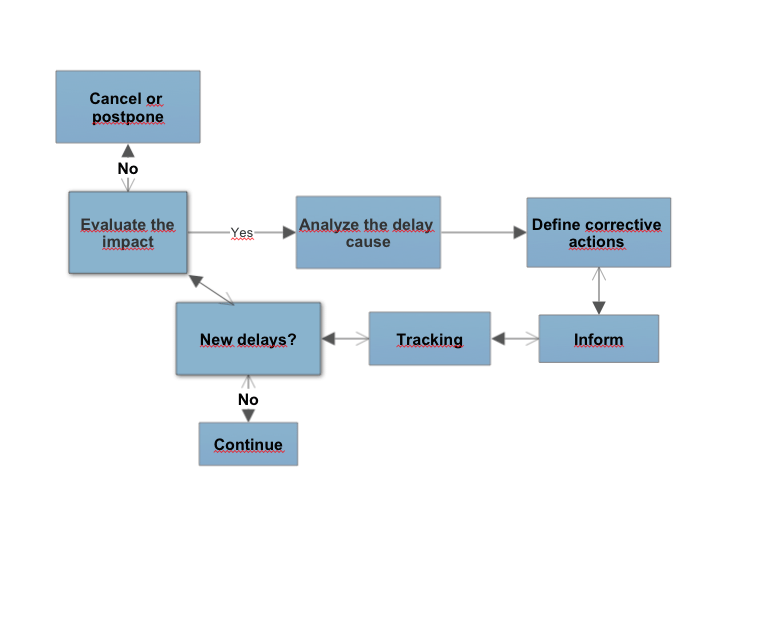During the course of a project, no matter how good the plan or how skilled and motivated the team responsible for its implementation, it is more than likely that it will become impossible to complete a certain task within the allocated period at one time or another.
When faced with such a delay in a project, the project leader should take the steps shown in the diagram below.

The first step is to assess whether the delay in completing this task has had an impact on the project as a whole. If this is the case, the project manager should examine the causes that led to the inability to complete the task within the allotted time. The next step is to take action and decide which measures should be adopted to complete the task and avoid delays in future projects. Furthermore, the project manager should inform the company directors of the delay and the measures adopted to resolve the situation. From this point on, careful action should be taken to ensure those measures are applied, no further delays occur and deadlines are respected.
Assess the impact of a delayed task
The first step to take when a delay in completing a task has been identified is to study the influence that this task and its delay has on the project as a whole. It is possible that some of the planned tasks are not essential for overall completion of the project or their delay simply has no effect on delivering the project as a whole. In these cases, the task can be cancelled or set aside for a later date.
The cases in which it is important to correct the delay to a task are:
-
When the task delay implies a risk to the project as a whole. If the delay to a specific task reduces the likelihood of completing the project or doing so within a certain deadline, the task should be reviewed and lost time should be recovered.
-
If the delay to a task could affect other areas of the same project. Not correcting a delay to the delivery of a task will have a knock-on effect on other tasks and lead to a delay to the project as a whole.
Analyze the causes leading to a task delay
The project manager should meet with those responsible for completing the task and analyze the causes that led to the inability to complete the task in the allotted time. The project manager should maintain an open mind and seek causes for the delay, not apportion blame. The delay was probably not caused by a mistake by the employees but rather other factors:
-
Delay caused by multitasking: The employees are busy on other project tasks and cannot dedicate their time and attention to the task that was delayed.
-
Lack of productivity: Inappropriate tools or methods are being used, which reduces productivity and therefore means more time is required to complete a minor task.
-
Starting the task late: It is possible that the a task delay is not due to an intrinsic problem with the task itself but rather a delay to previous tasks, leading to an accumulative knock-on effect on the task in question.
Define corrective measures
These will vary according to the reason for the delay. A few possible solutions to the examples given above could be the following:
-
Delay caused by multitasking. Establish priorities and eliminate or postpone those tasks that are not entirely necessary or, at least, not necessary at the present time.
-
Lack of productivity. Revise the tools and procedures used, and change those that are least productive.
-
Starting the task late. Because it is not an intrinsic problem with the task in question but rather the problem stems from a previous incident, the problem cannot be resolved in this task. However, further delays to the tasks being carried out at the time can be avoided.
Report on the delay and the corrective actions implemented
Company or project managers should be informed of both the delays that have occurred and the measures adopted to resolve the situation. Clearly, those employees involved in the project should also be informed, both those directly affected by the task delay and all those whose tasks are related to the delayed task.
Monitor the tasks
Closely monitoring all the tasks that are being carried out will enable further delays to be avoided. Furthermore, we should study the impact of the corrective measures adopted and apply the lessons learned to similar situations in the future.
